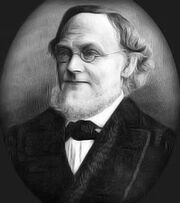(Adding categories) |
(Adding categories) Tag: categoryselect |
||
| (6 intermediate revisions by 3 users not shown) | |||
| Line 7: | Line 7: | ||
A Goldbach partition is the expression of an even number as the sum of two primes. The following are Goldbach partitions of the first 20 numbers: |
A Goldbach partition is the expression of an even number as the sum of two primes. The following are Goldbach partitions of the first 20 numbers: |
||
| − | *4=2+2 |
+ | *4=[[2]]+2 |
| − | *6=3+3 |
+ | *6=[[3]]+3 |
| − | *8=5+3 |
+ | *8=[[5]]+3 |
| − | *10=7+3 |
+ | *10=[[7]]+3 |
*12=5+7 |
*12=5+7 |
||
| − | *14=3+11 |
+ | *14=3+[[11]] |
*16=5+11 |
*16=5+11 |
||
*18=7+11 |
*18=7+11 |
||
| − | *20=13+7 |
+ | *20=[[13]]+7 |
Certain numbers have many Goldbach partitions. |
Certain numbers have many Goldbach partitions. |
||
| + | |||
| + | == Goldbach Conjecture (Proven)== |
||
| + | |||
| + | I think we are in the final shown. Because as stated in the article, with the two set [p; p_{1}; p_{2}.....] = 2N and [(2a+1); (2b+1); (2c+1);.....] = 2B. |
||
| + | We have. |
||
| + | (2a+1) + (2b+1) = 2B |
||
| + | (2A+1) + (2C+1) = 2b_{1} |
||
| + | |||
| + | If we apply the decomposition of each pair. |
||
| + | |||
| + | [(2a+1) - 2] + [(2b+1) +2] = 2B |
||
| + | |||
| + | Being (2a+1) the minor of the odd not prime, then. |
||
| + | |||
| + | [(2a+1) -2] = p |
||
| + | |||
| + | Turn: [(2b+1) + 2] \neq (2c+1) then [(2b+1) + 2]< (2c+1) with the which. |
||
| + | |||
| + | [(2b+1) + 2] = p_{n} |
||
| + | |||
| + | And so on. |
||
| + | Therefore all: |
||
| + | 2N = [p + (2a+1); p + p_{n}; p_{n} (2a+1); (2a+1) + (2n+1)] |
||
| + | |||
| + | Published in: http://www.hrpub.org/journals/jour_info.php?id= 24 Vol 3 (3) 2015 |
||
| + | |||
| + | {{Important Pages}} |
||
[[Category:Important Pages]] |
[[Category:Important Pages]] |
||
[[Category:Theorems and Proofs]] |
[[Category:Theorems and Proofs]] |
||
| + | [[Category:History of Prime Numbers]] |
||
Latest revision as of 00:45, 29 January 2017
Goldbach's Conjecture states that every even integer greater than 2 can be expressed as the sum of two prime numbers. This conjecture has been tested up to 4 quintillion (or 4*10^18) and has held true. However, it remains unproven, even though many people throughout the history of mathematics have attempted to prove it.

Christian Goldbach
Goldbach Partitions
A Goldbach partition is the expression of an even number as the sum of two primes. The following are Goldbach partitions of the first 20 numbers:
Certain numbers have many Goldbach partitions.
Goldbach Conjecture (Proven)
I think we are in the final shown. Because as stated in the article, with the two set [p; p_{1}; p_{2}.....] = 2N and [(2a+1); (2b+1); (2c+1);.....] = 2B. We have. (2a+1) + (2b+1) = 2B (2A+1) + (2C+1) = 2b_{1}
If we apply the decomposition of each pair.
[(2a+1) - 2] + [(2b+1) +2] = 2B
Being (2a+1) the minor of the odd not prime, then.
[(2a+1) -2] = p
Turn: [(2b+1) + 2] \neq (2c+1) then [(2b+1) + 2]< (2c+1) with the which.
[(2b+1) + 2] = p_{n}
And so on. Therefore all: 2N = [p + (2a+1); p + p_{n}; p_{n} (2a+1); (2a+1) + (2n+1)]
Published in: http://www.hrpub.org/journals/jour_info.php?id= 24 Vol 3 (3) 2015
